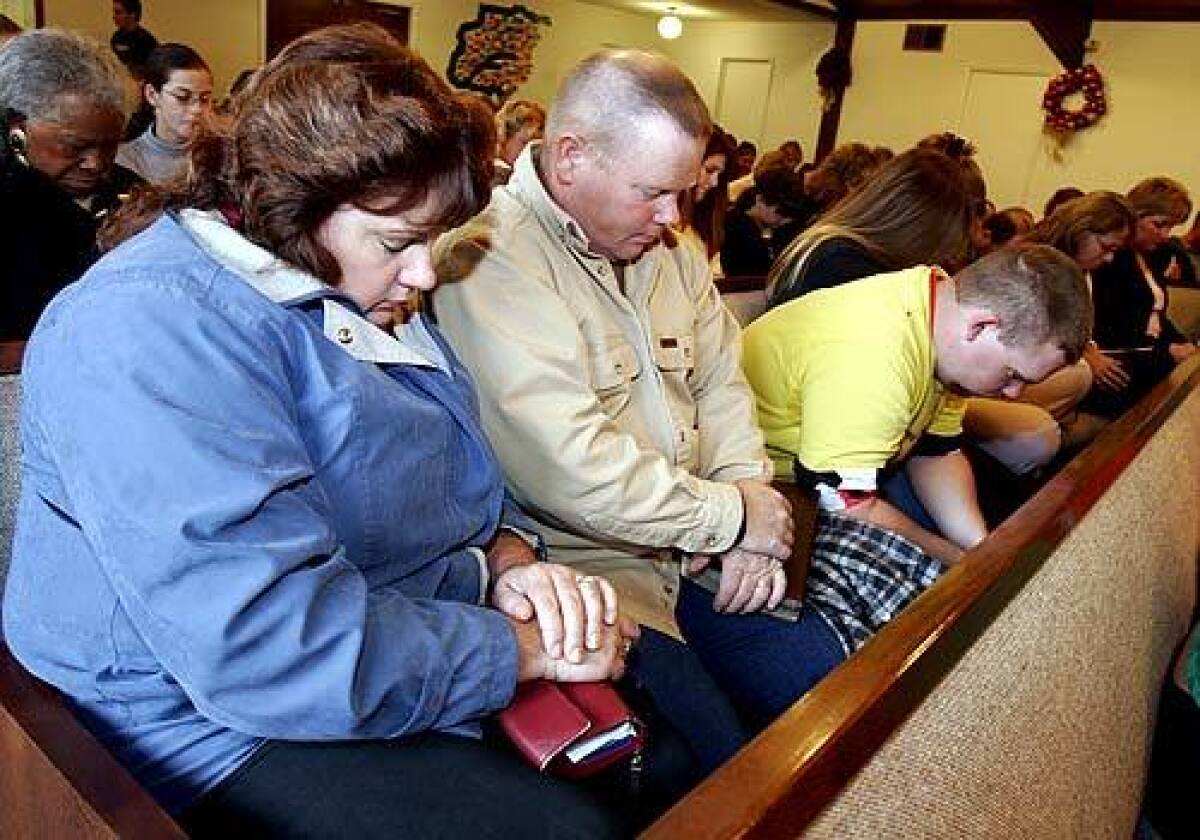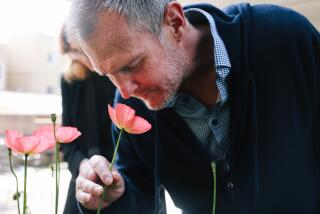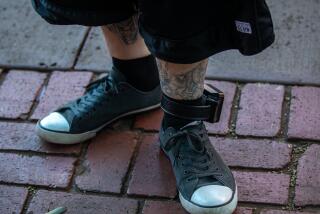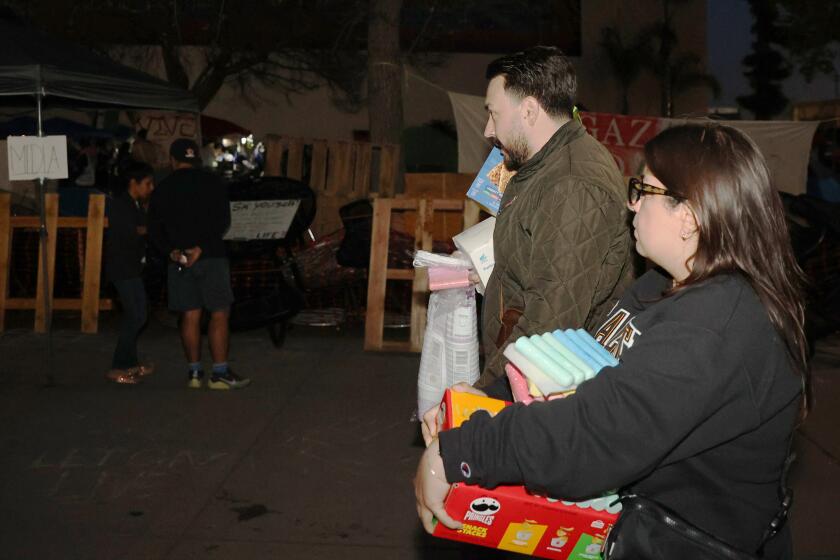Struggles Don’t End With Guardsmen’s Return

With the Iraq war, thousands of California families became combat families nearly overnight, as the California National Guard, and Guard units all over the country, began their first large-scale federal mobilization since the Korean War.
“We are proud of our combat role and of the tremendous job our soldiers and airmen have done performing it,” said California National Guard spokesman Maj. Jon Siepmann.
The problem comes, he said, when the soldiers return to a system that was designed for a Cold War strategic reserve. “Now we are a global expeditionary force, our mission requirements have increased, [but] the resources to support that mission have not kept pace,” he said.
Measured in broken families and disrupted careers, the human cost of the historic National Guard deployment is only now showing up. Federal counseling centers created in 1979 to handle Vietnam veterans have been flooded with recent returnees from Iraq, including many from the state National Guard.
Following are five family profiles from the Petaluma-based Company A, 579th Engineer Battalion, a much-decorated California National Guard unit that returned from Iraq in February and that has been the subject of several articles on this site.
The stories and photographs in this periodic series were produced as part of a continuing Los Angeles Times-UC Berkeley Graduate School of Journalism reporting project on the California National Guard under the direction of Times staff writer Rone Tempest.
Mary Lau, 25, San Lorenzo
Again and again, the kindness of strangers made Mary Lau’s life easier during the year her husband, Sgt. Jose Lau, served in Iraq.When a store clerk heard that her husband was a soldier, he gave her a discount on the auger she was renting for yard work. Her son’s pediatrician treated Jose Jr. for free. And then there was the day a woman in the checkout line, the wife of a Vietnam veteran, paid for Lau’s groceries.
“Don’t you worry, honey,” the woman said. “He’s going to come home.”
Mary Lau had never expected to be a military wife, never thought of worrying about a husband in a foreign war. Jose Lau, her high school sweetheart, joined the National Guard six years ago, when most guardsmen expected to train part time and be called up for domestic emergencies.
“He’s like, ‘It’s the National Guard,’ ” she recalled. “ ‘It’s really safe.’ ”
But by November 2003, Jose had begun training for Iraq. So she could look after Jose Jr., who was 5 months old at the time, she quit her job as a customer service phone representative.
“It was scary,” she said, her eyes widening. “Just being a parent for the first time with the responsibility and things like that.”
Jose was originally with Company A, 579th Engineer Battalion, but he served in Iraq with a Southern California unit that needed more soldiers. Jose, a mellow 26-year-old, bonded with his new company, but his reassignment was hard on his wife.
“I didn’t know any of the wives down there,” Mary said. “That makes his deployment 10 times harder.”
News about her husband was hard to come by through official National Guard channels, she said. She relied on Jose’s phone calls for information.
Almost nine months after his safe return, the couple sat in the living room of their old red farmhouse and talked about married life, post-Iraq, while Jose Jr., now an energetic toddler, darted about the room.
“A lot of reservists come back home to jobs that are nonexistent,” Jose said. “I worked at a [car] dealership for five years. I came back and they were out of business.”
He found work as a security guard but is still waiting on $2,000 in per diem pay owed by the National Guard, the couple said.
“That’s $2,000 we could be making interest on in a banking account or saving for emergencies,” Mary said.
She is disappointed that the National Guard did little to prepare her for her husband’s return.
“No party, no debriefing,” she said. “No information on how to deal with a soldier coming in from a war zone.”
It was soon evident that war had changed her husband.
“When he first came back, it was very happy,” she said. “But then, like, little things would make him upset. He gets irritated over little things, and that’s very different than the way he was. And I’m thinking it’s my fault.”
“I had a role in the house,” Jose said. “All of the sudden, I come home and I was no longer needed.”
Counseling sessions at a Department of Veterans Affairs hospital have helped the couple, but they are still adjusting.
“And people forget how hard it is,” Mary said. “It’s not over. It will never be over. Things affect people — and families.”
By Vanessa Gregory
Amy Dale, 38, Lucerne
Amy Dale was lying under her car on the side of the road, crying. Her 16-year-old daughter had called her when it broke down. Dale got down to look at the car but didn’t know what to do. Her husband, Randy, 43, a staff sergeant in the California National Guard serving in Iraq, usually took care of such things.It was the same when the clothes dryer broke.
“I had to teach myself how to fix it,” she said. “I was on the phone with my dad, and my dad had to teach me about water pipes in the wall and when they burst, because Randy was gone.”
Then came the first $500 phone bill, racked up talking to her husband in Iraq. She knew she had to find a job to add to money she earned cleaning her church. She took on the night shift at Curves gym, leaving her daughter and 14-year-old son home alone.
She spent two wedding anniversaries alone, and her kids’ grades fell.
“I remembered being overwhelmed at times,” Dale said. “Usually it was those times like when I was cleaning the church by myself. I had time to reflect. And usually if I got real down and depressed, I tried to remember to pray about it. But there was times when I did feel totally overwhelmed.”
But something happened in Iraq that made up for Dale’s hardships at home: Her husband found religion.
Today, she is grateful for his deployment.
“I had been praying for years and years that my husband would accept the Lord and become a Christian,” she said. “And so when it looked like he was going to go [to Iraq], I looked at it like this must be what the Lord’s going to use to bring him closer to him.
“And sure enough, when your very life is at stake, you think about things and you think about where you’re going to go [after death], so he did accept the Lord,” she said.
In Iraq, several of Randy’s fellow soldiers prayed before every mission, and he said their faith moved him.
“I’ve always believed, but I didn’t live the life until I got over there,” he said.
The moment that reaffirmed his faith, he said, was “when I came home and I didn’t have a scratch.”
Randy’s newfound spirituality has eased his transition back to civilian and family life, his wife said. Although many couples have trouble readjusting to sharing household duties or dealing with the lingering effects of battle, Amy Dale said her marriage is better than ever.
“It was like it kindled the fire quite a bit,” she said. “Absence really made the heart grow fonder, and we just have been loving being together again.”
Randy lost his job as a truck driver shortly after his return in February 2005, but the couple saw even that in a positive light.
“We didn’t panic, because we know that the Lord’s going to look out for us. And [Randy’s] at that point too, that he realizes that the Lord really does look out for us — and if need be, provide a job for him to do,” Amy said. These days, her husband works full time for the Guard.
“We’re not looking at last year like it was a negative thing,” she said. “We’re looking at it like it was a positive thing. We made it through.”
By Claire Miller
Gene Schoen, 42, Chico
Gene Schoen couldn’t breathe. He couldn’t sleep. But he could drink.It was three months since his return from Iraq. A former Army soldier, now a member of the California National Guard and a veteran of both the Persian Gulf War and the Iraq war, Schoen had taken to the bottle as “a way to hide the past.”
Twice, the thought of driving two miles to work at the National Guard armory in Chico was enough to give him an anxiety attack. He sipped a little, then called in sick. Several times, he used alcohol to medicate his nightmares and anxiety — then made excuses so he wouldn’t have to drive for out-of-town assignments, help his girlfriend move or take his two children to the movies.
“It’s been one hell of a freaking year,” Schoen said one recent night, recalling how his best friend had been blown to bits in Iraq. How Schoen, as a veteran soldier in his company, had been the one to pack the belongings of most of their fallen comrades. How he had become the “counselor, psychologist, mediator, everything else” for armory families when their soldiers returned home short-tempered, anxious and angry.
Drinking was at first his way to celebrate. Then, it was a way to comfort.
“There was a time and a place it was supposed to stop,” Schoen said. “And it didn’t.”
He sat in his Chico home, where a painting of John Wayne hangs above large, brown, comfortable couches. Here, it is a clear that a man does the decorating. Everything is neat but spare. Also, there is not a sign of Schoen’s ex-wife, who abandoned the family five years ago. She is now in prison, convicted of drug charges. Since her departure, Schoen has been doing the cooking, cleaning and parenting alone.
“I just love watching my kids. It’s a crackup,” he said that night. His son and daughter, ages 12 and 11, flitted in and out of the living room, made plans for attending a school dance, asked to show their giggly dance routines. Schoen sighed with the weariness of a single parent but watched good-humoredly.
“He is the best mother and father I’ve ever seen,” said Schoen’s 80-year-old mother, Louise, who lived with the kids for 18 months while their father was deployed. It was a difficult time: a grandmother struggling with homework, everyday bumps and bruises, asserting authority over two children who felt cut adrift.
“I thought I could handle it. Two kids? A cinch!” Louise Schoen said. “But the life revolved around Gene. You have no idea how strong that bond is. And when he left, they felt abandoned — again.”
On the night Schoen left, his daughter, Catrina, walked through the door of the house, screaming, “I can’t live without my daddy!” and ran back to her bedroom. Every night after that, she went to sleep wearing one of his T-shirts and clutching his photograph.
For his part, Schoen confessed that in Iraq he didn’t much consider how things were going at home. Even when thinking about deploying with his company, Schoen said, he didn’t realize how his position — as a single father — was different from those of other soldiers. They were also leaving families behind, he thought. And anyway, if his men were going to Iraq, so was he.
When he returned, he discovered that his family had omitted sorry details from their daily e-mail and instant messages. In the last 18 months, Catrina had locked herself in her bedroom, kicked in a door, thrown a picture frame at her grandmother, even hit her once. Gene Jr. had taken to punching pillows.
“I thought I had such a family structure going,” Schoen said. “But I didn’t take into perspective that they still had problems from what happened with their mom.”
Schoen is a warm and sociable guy, a 6-footer who seems at ease with others. As usual, he was expecting other members of his armory unit that Friday night. The agenda? An electronic version of the card game Uno and — at least for Schoen — no drinking. It was his 78th sober day.
What had made the difference? He had decided his life was slipping away.
Schoen had been to the doctor and discovered that his combination of drinking and taking an antidepressant was harming his kidneys and liver.
His kids complained that he wasn’t as much fun as he used to be. Despite their increased need for reassurance, Schoen would make and then break promises to go swimming or dirt biking. He was snappish and unsociable. Finally — after his girlfriend left him and he was again vomiting in a toilet — Schoen decided, “I didn’t come all the way home to die over something stupid.”
Now, he is on a health kick. He takes his rucksack out for hikes and has planned a memorial march for the company in El Paso. He says he doesn’t have many anxiety attacks now. “And if I do, I just suck it up and go.”
Even so, he can’t shake the feeling that he shouldn’t have had to face all of this alone. That there should have been more National Guard support for him and for other Guard families.
“I don’t believe the troops got what they should have,” Schoen said. “They need to take care of the families. They need to explain to us, as families, what your kids and spouses have been through. And not just what happened back in Iraq. What happens over here is not always pleasant.”
By Amanda Beck
Tonya Saleda, 40, Sonoma
Tonya and Jim Saleda are planning an intimate family Christmas at home to celebrate his first holiday season back from Iraq, where he served as a staff sergeant in the California National Guard.But the holiday spirit hasn’t lessened Tonya’s bitterness toward the Guard.
During a meeting at the Petaluma armory just before the soldiers left, she recalled, the Guard officers pledged to help the families left behind.
“They gave all the big expectations, the promises, we’ll have support for you,” Saleda said.
Instead, she said, she and her 6-year-old daughter, Emily, were forgotten.
“I wasn’t happy with the whole support of the National Guard at any point of his deployment,” she said. “Some of the families just kind of fell through the cracks.”
There was no one “calling the families to see how they’re doing: ‘Are your kids having issues? Is everybody OK?’ None of that,” she said.
The National Guard leadership admits that its response to the needs of its returning soldiers and families has often been lacking.
“We’ve relied heavily on the chain of command and on some innovative outreach programs to help where we can,” said Siepmann, the Guard spokesman. “But they are no substitute for fully resourced installations or close-knit military communities.”
Tonya Saleda said she got far more help from the Oakland Police Department — where her husband, 43, was a patrolman before being called to active duty — than she did from the California National Guard.
Without family or friends in the military and feeling let down by the Guard, Saleda said, she tried not to think about her circumstances and kept pushing through her daily life, working as a police dispatcher in Santa Rosa and taking care of Emily.
“You just have to pretend” that things aren’t so hard, she said. “You kind of go on autopilot. You know you have to do it, so you just do it.”
But there were times it was impossible to pretend.
Emily had nightmares about a “bad man in her room, and her dad wasn’t there to arrest him,” Saleda said. The worst moment came when she found Emily crying in her bed one night. She had to run away to the neighbor’s house, she told her mother, to see if they could find her father.
“She had a lot of issues . I felt like I was failing her,” Saleda said.
Just before her husband came home in February, Saleda attended a counseling session for families. It was the first time she had heard from the Guard in months.
The counselor “was scaring these wives to death,” Saleda said. “He’s telling us, ‘They’re not your husbands anymore, they’re soldiers. Don’t be surprised if they set up their tents in the backyard.’ ”
The transition to civilian life raised a new set of problems.
At first, Jim Saleda would scan rooftops when he stopped for gas, or tense up when he passed debris on the side of the road. Then the physical problems started.
He has “mini-strokes,” Tonya said, when his speech slurs, his tongue swells and he can’t remember what he’s trying to say. Doctors have not made a diagnosis, but he says two other guardsmen in his unit have similar symptoms.
Jim has been irritable too. His wife recently asked him if he agreed that his return home had strained their marriage.
“He just started laughing,” she said. “He said, ‘Yeah, there’s been some problems. Lots of arguments.’ ”
Tonya has been stubborn. She has had trouble giving up the single-mother routine she developed while he was gone.
“On my part, it’s that I’ve done this by myself for the last 15 months, and I can do it by myself.” And on the men’s part “they want to reattach to the family,” she said. “So it’s a lot of stubbornness and head-butting.”
By Claire Miller
Theresa Edwards, 40, Redwood City
Theresa Edwards struggled to take care of her house, raise her 10-year-old daughter and cope with her own loneliness while her husband, Steve, was in Iraq with the California National Guard. She hoped everything would improve when he came home last February.And it did.
“It was great for two weeks,” she said.
Then one day she decided to take Steve to Trader Joe’s to shop for his favorite specialty foods.
Waiting in line with a full cart, she turned to him and noticed he was shaking, his eyes full of tears. It was too crowded and loud and he said he had to get out of the store.
One of the other customers in the store reminded him of the Iraqi civilians he used to see on the streets of Balad, where he was posted with his unit.
Edwards, who had been with her husband almost 11 years, had never seen him break down like this.
Before he went to Iraq, she said, “he was fearless, he would walk with his shoulder thrown back and was very sure of himself.”
Things only got worse after the Trader Joe’s episode.
He scanned the rooftops of buildings, looking for snipers. His wife had to be careful when she struck a match, because the smell reminded him of a bombed Humvee. On his worst days, he wrapped himself in a blanket and just sat on the couch.
Finally, he asked her to drive him to the Department of Veterans Affairs medical center in nearby Palo Alto, where he was diagnosed with acute post-traumatic stress disorder.
He recently attended a Buddhist retreat in Oregon that caters to veterans suffering the after-effects of war.
His condition has not improved much. The couple have considered enrolling him in a resident program at the Palo Alto hospital, where he can receive more intensive counseling.
For his part, Steve wishes he could do more to help.
“Most women would have left a guy like me already; they would have gone the easy route,” he said.
Theresa has tried to stay optimistic, but it’s difficult.
She says she misses the affection the couple shared before he went to Iraq. “He’s numb,” she said.
Sometimes she comes home from her work at a Silicon Valley technology company, goes into her bedroom and cries. But she also notes that “breaking down isn’t really an option, because there is no one there to catch my fall.”
The Edwardses know the next couple of months are crucial to their future.
“This is the make-it-or-break-it stage,” Theresa said. “I know I can’t live like this for the rest of my life, and he’s said he can’t either.”
By Jakob Schiller
More to Read
Start your day right
Sign up for Essential California for news, features and recommendations from the L.A. Times and beyond in your inbox six days a week.
You may occasionally receive promotional content from the Los Angeles Times.






